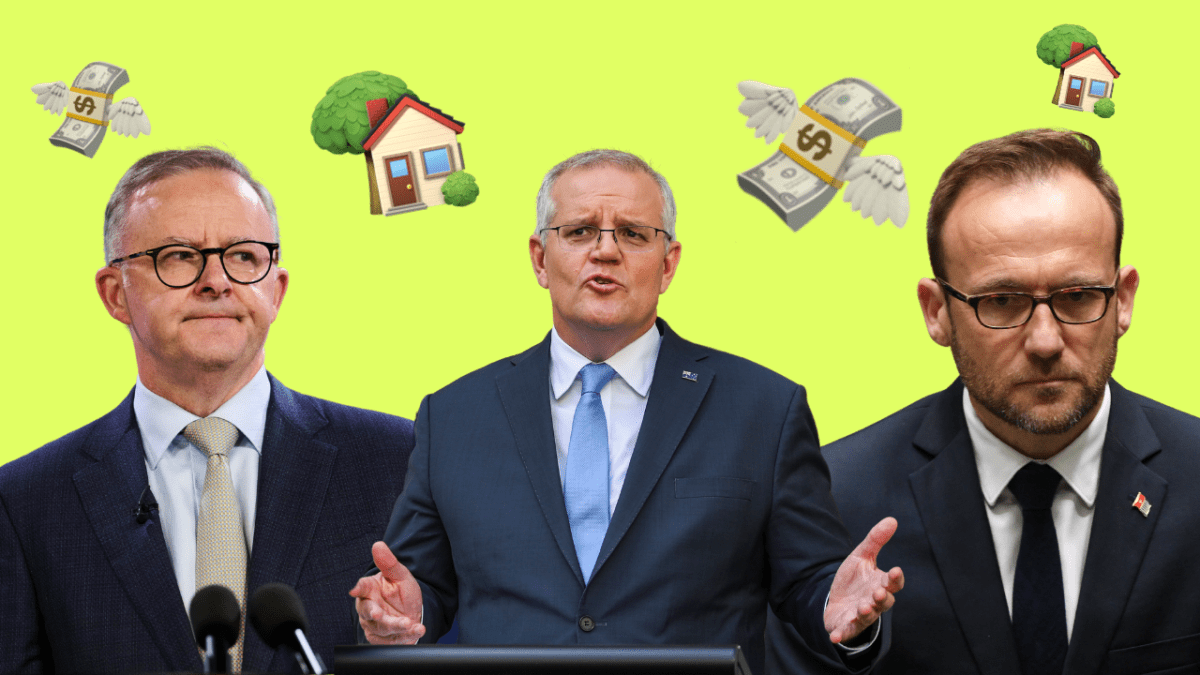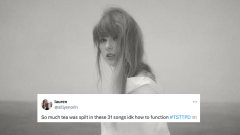
The countdown to election day is on and because the Coalition’s held power for almost a decade, this is Australia’s big chance for change. So we’re here to help you understand and compare each major party’s big promises and policies on housing and cost of living and lay it all out without the political spin.
NOTE: promises are often broken. So we’ve also prepared a little look back at the voting track records of Scott Morrison, Anthony Albanese and Adam Bandt — because what they do speaks louder than their words.
We’ll compare the Coalition, Labor and the Greens’ policies on all the issues important to young people.
We’ve narrowed them down to: climate change, the cost of living and housing, women’s rights, LGBTQIA+ rights, First Nations rights, mental health and education.
So now let’s look at our fucked housing and rental markets and skyrocketing inflation.
As we know, everything is stupidly expensive rn due to rising global oil prices, floods in NSW and Qld effecting local agriculture and transport and widespread labor shortages due to strict border policies.
Australian consumer prices jumped 2.1 per cent in the first three months of 2022 — the biggest quarterly jump since GST was introduced more than 20 years ago. Petrol prices reached a record high earlier this year and house prices are, as usual, eye-wateringly steep.
It’s a multi-faceted issue, basically: goods and services = too expensive, wages = too low. So what is each party planning to do about it?
The Coalition’s housing and cost of living policies
The Morrison government knows the high cost of living will be one of the focal points of the election campaign and a key issue for voters.
When it released its annual budget in March many of its big-ticket items were one-off cash handouts and tax cuts. Aside from some extra subsidies for medicines and childcare, tax cuts and handouts are pretty much the centrepiece of their plan.
But giving someone an extra $250 doesn’t address the causes of the problem.
The government also halved the tax on petrol in March which saw prices come down to closer to $1.50 per litre for a week or two but they’ve since risen again by 20 to 30 cents. This excise will last six months but so far I don’t feel like I’ve saved any money. What happens when taxes return to normal?
The Coalition has taken a stab at making it easier to enter the housing market with its housing policy. Its Home Guarantee Scheme would mean some first home buyers would only need to cough up a five per cent deposit for a home, rather than 10 per cent. But this doesn’t actually makes homes cheaper and critics say it encumbers young people with more debt.
It said the scheme has already helped 60,000 people buy homes and if elected it would raise the number of low-deposit guarantees for first home buyers to 35,000 each financial year. So good luck getting a spot.
But the Coalition hasn’t really committed to building new affordable housing — a strategy that experts say could lower house prices. However, it has promised a $2 billion investment in low-cost financing for affordable and social housing. Yep, loans only.
It hasn’t really said anything about renters, woo.
Labor’s housing and cost of living policies
Albanese announced on Sunday Labor’s high cost of living policy would look like “ongoing help with the cost of living for families — not one-off hand-outs”.
He pledged to put more money into childcare, aged care and medicare as well as increase wages for aged care workers and nurses and close the gender pay gap.
But Labor hasn’t made any concrete promises about raising minimum wage (unions say we desperately need to see a 5 per cent jump) nor has it committed to raising welfare payments. So basically, there isn’t much yet for Australia’s least financially secure people.
Under a Labor government 10,000 first home buyers could have up to 40 per cent of their home’s total cost covered under the Help to Buy equity scheme. The idea is that buyers wouldn’t have to borrow as much money from a bank, instead the government would own a stake in your home. You can either buy the government out of its share or, when it comes time to sell the house, the government would take back whatever percentage of the sale price it invested originally — likely a profit for them. Similar schemes already exist in several Australian states.
Labor also announced a $10 billion Housing Australia Future Fund and promised to build 20,000 social housing properties in its first five years in office.
Of those homes 4,000 would be allocated for women and children fleeing domestic and family violence and older women on low incomes who are at risk of homelessness. A further 10,000 affordable homes would be specifically built for frontline workers like police, nurses and cleaners to be able to live close to work.
It hasn’t really said anything about renters, woo.
The Greens’ housing and cost of living policies
Like Labor, the Greens’ cost of living policies fund more services rather than giving people tax cuts. And its policies sure are ambitious.
Childcare, dental and mental health care are all fkn expensive and contribute to a person’s cost of living, so the Greens wants to make them completely free.
It has also argued that for 20 years the minimum wage in Australia has been so low it’s left people below the poverty line. It promised to establish a minimum living wage at 60 per cent of the median wage so no one earns below the poverty line.
It also plans to raise all welfare payments to $88 a day. That’s double what people on JobSeeker currently get.
For housing policy it’s taken Labor’s idea to build more homes and jacked it the fuck up with a plan to build one million affordable homes over 20 years. This includes 125,000 homes that would be available under a similar shared ownership scheme to Labor’s. Each of these homes would be available to buy for no more than $300,000.
For renters the Greens have promised to strengthen renters’ rights and establish a National Standard of Renters’ Rights which would places limits on how much and how often your landlord can increase your rent if you live in a private rental and prohibit “no grounds” evictions.







